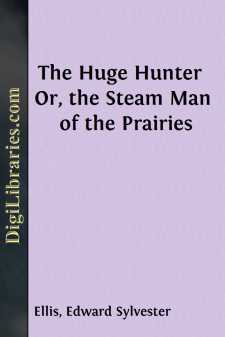Categories
- Antiques & Collectibles 13
- Architecture 36
- Art 48
- Bibles 22
- Biography & Autobiography 813
- Body, Mind & Spirit 141
- Business & Economics 28
- Children's Books 12
- Children's Fiction 9
- Computers 4
- Cooking 94
- Crafts & Hobbies 4
- Drama 346
- Education 46
- Family & Relationships 57
- Fiction 11826
- Games 19
- Gardening 17
- Health & Fitness 34
- History 1377
- House & Home 1
- Humor 147
- Juvenile Fiction 1873
- Juvenile Nonfiction 202
- Language Arts & Disciplines 88
- Law 16
- Literary Collections 686
- Literary Criticism 179
- Mathematics 13
- Medical 41
- Music 40
- Nature 179
- Non-Classifiable 1768
- Performing Arts 7
- Periodicals 1453
- Philosophy 64
- Photography 2
- Poetry 896
- Political Science 203
- Psychology 42
- Reference 154
- Religion 513
- Science 126
- Self-Help 83
- Social Science 81
- Sports & Recreation 34
- Study Aids 3
- Technology & Engineering 59
- Transportation 23
- Travel 463
- True Crime 29
Edward Sylvester Ellis
Edward Sylvester Ellis (1840-1916) was a prolific American author known for his contributions to juvenile fiction, particularly Westerns and adventure stories. Among his most famous works is "The Steam Man of the Prairies" (1868), which is considered one of the earliest science fiction novels featuring a robot-like invention. Throughout his career, Ellis wrote under various pseudonyms and produced over 400 novels, captivating young readers with tales of frontier life and adventure.
Author's Books:
Sort by:
AT THE RANCH. Avon Burnet, at the age of eighteen, was one of the finest horsemen that ever scurried over the plains of Western Texas, on his matchless mustang Thunderbolt. He was a native of the Lone Star State, where, until he was thirteen years old, he attended the common school, held in a log cabin within three miles of his home, after which he went to live with his uncle, Captain Dohm Shirril,...
more...
FAIRPORT. Were you ever on the coast of Maine? If so, you know how the rocky shores stretch out now and then clear into the ocean, and fret the salt waves till they are all in a foam. Old Ocean is not to be so set at defiance and have his rightful territory wrung from him, without taking his revenge after his own fashion. Far up into the land he sends his arms, and crooks and bends and makes his way...
more...
CHAPTER I. THE TERROR OF THE PRAIRIES. 'HOWLY vargin! what is that?' exclaimed Mickey McSquizzle, with something like horrified amazement. 'By the Jumping Jehosiphat, naow if that don't, beat all natur'!' 'It's the divil, broke loose, wid full steam on!' There was good cause for these exclamations upon the part of the Yankee and Irishman, as they stood on...
more...
CHAPTER I. Kit Carson's Youth—His Visit to New Mexico—Acts as Interpreter and inVarious Other Employments—Joins a Party of Trappers and Engages in aFight with Indians—Visits the Sacramento Valley. "Kit Carson," the most famous hunter, scout and guide ever known in this country, was a native of Kentucky, the scene of the principal exploits of Daniel Boone, Simon Kenton, the Wetzel...
more...
CAPTAIN STRATHMORE’S PASSENGER A few hours before the sailing of the steamer Polynesia, from San Francisco to Japan, and while Captain Strathmore stood on deck watching the bustle and hurry, he was approached by a nervous, well-dressed gentleman, who was leading a little girl by the hand. “I wish you to take a passenger to Tokio for me, Captain Strathmore,” said the stranger. The honest, bluff...
more...
THE GOLD-HUNTERS. Jeff Graham was an Argonaut who crossed the plains in 1849, while he was yet in his teens, and settling in California, made it his permanent home. When he left Independence, Mo., with the train, his parents and one sister were his companions, but all of them were buried on the prairie, and their loss robbed him of the desire ever to return to the East. Hostile Indians, storm, cold,...
more...
DANGER AHEAD. There was snow in the air. Warren Starr had felt it ever since meridian, though not a flake had fallen, and the storm might be delayed for hours yet to come. There was no mistaking the dull leaden sky, the chill in the atmosphere, and that dark, increasing gloom which overspreads the heavens at such times. Young Warren was a fine specimen of the young hunter, though he had not yet passed...
more...
CHAPTER I. RETROSPECTIVE. Those of my friends who have done me the honor of reading "Campfire and Wigwam," will need little help to recall the situation at the close of that narrative. The German lad Otto Relstaub, having lost his horse, while on the way from Kentucky to the territory of Louisiana (their destination being a part of the present State of Missouri), he and his young friend, Jack...
more...
AN ESTRAY. One day in the autumn Terence Clark came to the house of Frederick Linden and urged him to join in a hunt for a cow that had been missing since the night before. The latter got the consent of his mother and the two lads started on a search that proved to be the most eventful one they had ever known. A few words in the way of explanation must be given at this point. The date of the events I...
more...
THE RESCUE. If it were done, when 'tis done, then 'twere well It were done quickly.—Macbeth. "Quick, boys, and be careful that they don't see your heads." Four men were moving along under the bank of the Miami, with their bodies bent, at a gait that was almost rapid enough to be called a run. They were constantly raising their heads and peering over the bank, as though watching...
more...






![Adrift on the Pacific
A Boys [sic] Story of the Sea and its Perils](https://digilibraries-com.s3.eu-central-1.amazonaws.com/covers/5b1ab9f1-643e-492e-89a5-0a940f25d89d.jpg)




